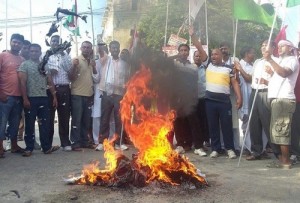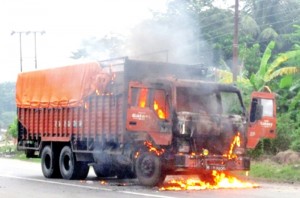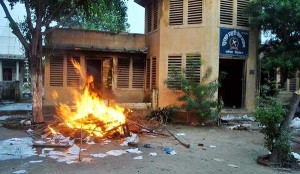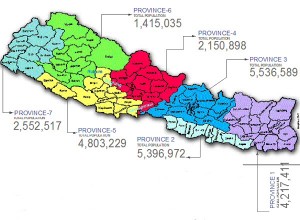How can the ongoing bandh and riots over the constitution benefit the people in Terai? Indeed, politics has its own calculations of “benefit” and “advantage” – securing “vote banks”, “positions” and “influence” may be part of it – but ordinary people may have a hard time seeing what they gain from it. Sure, party leaders justify their respective demands and actions as ultimately serving the “people” as a whole – or at least their constituencies – but meanwhile most locals seem to only suffer from the escalating conflict.
The local economy has already lost billions of rupees. In fact, Federation of Nepal Chambers of Commerce estimates that the conflict has hit the national economy even harder than the earthquake in April! The industrial sector is losing worth 20 million rupees a day as local industries remain closed down; the trading sector are looking at daily losses of 100 million rupees; and tourism is not doing any better. In Biratnagar, over a 100 hotels remain closed down so far with a total loss of 4 billion rupees!
 There is no sign of de-escalation either. Many trucks remain stranded in Birgunj and other towns along the border as road blocks and attacks on vehicles and drivers continue. In Bara, three trucks loaded with sugar only reached a few kilometres before they were intercepted and torched by protesters. In Sunsari, the district administration just called in the army to patrol the highway but bandh enforcers still stand their ground waving clubs and guns. Police have escorted some trucks at night but most drivers must see their cargo rot!
It’s not only about industries and the local economy. Schools are closed down too in many towns and villages. In Dang, all 200 schools were closed in mid-august – like in so many other districts – allowed to re-open only one month later. Meanwhile, many other schools remain closed just as curfews hinder students from attending classes. The health sector is hit as well. In Biratnagar, ambulance services have stopped after assaults on ambulance drivers and vehicles. Police posts in many villages have relocated as armed attacks are a real threat!
So what’s the “advantage” or “benefit” to the people? Well, it’s a struggle over boundaries – how the future provinces under the new constitution will be delineated – and Madeshi and Tharu leaders are particularly unhappy with the layout. They are concerned not least about the issue of whether their ethnic groups will make up the majority of voters in their future provinces. To the leaders involved in the conflict, the damage to the economy, even the thirty-plus people killed so far, may be worth it. But to the millions of locals whose everyday lives are so seriously interrupted, it might not.
There is no sign of de-escalation either. Many trucks remain stranded in Birgunj and other towns along the border as road blocks and attacks on vehicles and drivers continue. In Bara, three trucks loaded with sugar only reached a few kilometres before they were intercepted and torched by protesters. In Sunsari, the district administration just called in the army to patrol the highway but bandh enforcers still stand their ground waving clubs and guns. Police have escorted some trucks at night but most drivers must see their cargo rot!
It’s not only about industries and the local economy. Schools are closed down too in many towns and villages. In Dang, all 200 schools were closed in mid-august – like in so many other districts – allowed to re-open only one month later. Meanwhile, many other schools remain closed just as curfews hinder students from attending classes. The health sector is hit as well. In Biratnagar, ambulance services have stopped after assaults on ambulance drivers and vehicles. Police posts in many villages have relocated as armed attacks are a real threat!
So what’s the “advantage” or “benefit” to the people? Well, it’s a struggle over boundaries – how the future provinces under the new constitution will be delineated – and Madeshi and Tharu leaders are particularly unhappy with the layout. They are concerned not least about the issue of whether their ethnic groups will make up the majority of voters in their future provinces. To the leaders involved in the conflict, the damage to the economy, even the thirty-plus people killed so far, may be worth it. But to the millions of locals whose everyday lives are so seriously interrupted, it might not.

Protesters burning copies of the draft constitution while local economy is losing millions every day





